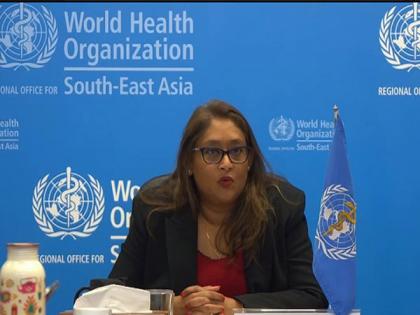Saima Wazed gives call to make walking, cycling safe for all on 8th UN Global Road Safety Week
By ANI | Updated: May 12, 2025 13:02 IST2025-05-12T12:56:23+5:302025-05-12T13:02:43+5:30
New Delhi [India], May 12 : Saima Wazed, Regional Director for WHO South-East Asia gaver a call to make ...

Saima Wazed gives call to make walking, cycling safe for all on 8th UN Global Road Safety Week
New Delhi [India], May 12 : Saima Wazed, Regional Director for WHO South-East Asia gaver a call to make walking and cycling safe for everyone. She made the remarks on the occasion of the 8th UN Global Road Safety Week.
The UN Global Road Safety Week is marked biennially, starting on the third Monday of May.
"This year, the theme urges the world to make walking and cycling safe for everyone. Walking and cycling are an integral part of the multimodal transport systems in the Global Plan for the Decade of Action for 'Road Safety 2020-2030'. They also promote healthy and sustainable cities and lifestyles", she said.
Wazed noted that globally every year, road traffic crashes take a devastating toll on communitiesclaiming the lives of nearly 1.2 million people and leaving up to 50 million more with non-fatal injuries.
"These tragedies are not mere statistics. They are the loss of children, parents, and loved onesand are largely preventable", she said.
She highlighted that road traffic injuries are now the leading cause of death among young people aged 5 to 29 years, and they continue to be a pressing public health concern in the WHO South-East Asia Region.
In 2021 alone, the region accounted for more than 330,000 deaths from road crashes, representing 28 per cent of the global total.
Vulnerable road usersincluding pedestrians, cyclists, and operators of two- and three-wheelersare up to 66 per cent of these fatalities.
Noting that this year's theme is a timely call to action, Wazed said that "Pedestrians and cyclists already account for more than one in four road traffic deaths. Ensuring their safety is not only a matter of saving lives. Prioritizing walking and cycling supports physical activity, which is a key modifiable risk factor for non-communicable diseases such as heart disease, stroke, diabetes, and cancers. Walking and cycling also support mental well-being, helping to reduce symptoms of depression and anxiety."
Emphasising that road safety is an important element of WHO guidance for healthy cities, Wazed noted that "In our region, the WHO partnership for healthy cities has been working extensively with megacities such as Mumbai and Bangkok to address road safety and promote safe transportation. This included improved designs of pedestrian walkways, through the assessment of hundreds of kilometres of roads and sidewalks, and through universal inclusive designs for accessible walkways.
"Creating safe, inclusive, and accessible roads for all in the densely populated cities of South-East Asia is challenging. However, doing so will support the population, especially the most vulnerable, through improved community well-being and environmental sustainability. When we integrate road safety with the promotion of physical activity, we address interconnected challenges: injuries, non-communicable diseases, mental health, and even climate change. I urge all Member States, civil society, the private sector, and communities to push for people-centred mobility policies, safer road design, safe vehicles, and lower speed limits", Wazed said.
In her concluding remarks she gave a call for people to come together to ensure a safe walking and cycling experience in their communities. Wazed said, "Together, let us ensure that every personespecially our children and youthcan walk and cycle safely in our communities and on roads. By doing so, we not only improve road safety but also advance climate action, health promotion, and the Sustainable Development Goals."
Disclaimer: This post has been auto-published from an agency feed without any modifications to the text and has not been reviewed by an editor
Open in app